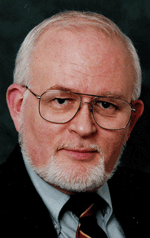| Home about PCT Presentation Order | |
|
|
About Tom BourbonTom Bourbon (Walter Thomas) received his B.A. and Ph.D. degrees in experimental psychology, with emphases in human perception and in physiology. Early in his career, he worked in industry in the field of human factors (ergonomics) on projects relating to sonar and radar systems for the U.S. Navy, and on products including the original version of the little box people peer into for a vision test when renewing their license to drive. For the better part of a year after he received his doctoral degree, Bourbon had a recurring dream in which his dissertation committee knocked at his door to announce that they must, "Take it back—No one should have a degree for that." Needless to say, he was deeply disappointed with what passed as "science," in the "scientific" psychology he studied for his degrees. He left industry to hide out at a small Texas university, where he could try to figure out how psychology might be made into a real science. He remained there for the next twenty-six years. Seven years into that stay he discovered the work of William T. Powers—what was then called Control Systems Theory (now Perceptual Control Theory, PCT). In one single hair-on-the-arms-raising moment, he realized that Powers had done it: Powers showed the way to create a genuine science of behavior. For the next nineteen years, Bourbon taught PCT to all of his students—undergraduates as well as graduates. Among his fifty masters degree students, fifteen performed their research on topics directly related to PCT. Some of those students did pioneering work using PCT to explain social interactions. During the final eight years of his university career, he collaborated on research into human brain functions, in the neurosurgery department at a Texas medical school. On the side, he enticed some of his medical school associates to examine PCT as an alternative way to do science. Eventually, after receiving an offer from the medical school that he thought he could not refuse, he moved there. One of his goals was to use theoretical ideas and research methods from PCT to develop new diagnostic and assessment procedures for people with neurological damage or impairment. Before long, the lab was moved to another medical school where support for non-traditional science was weak. Bourbon retired from the medical school and spent the next few years as a consultant with a person who attempted to use ideas from PCT in a "discipline" program for schools. In that role, he taught PCT to many educators across the United States as well as in New Zealand, Australia and Singapore. Along the way, he served as an Associate Supervisor for Ph.D. research in psychology by a young man—Timothy A. Carey—at the University of Queensland, Australia. Bourbon and Carey now collaborate as authors of articles and books in which they apply ideas from PCT to "behavioral problems" that people encounter at home, in schools and in clinical settings. Bourbon is a proud and busy grandfather, a retired volunteer fire chief, and an active instructor in courses where he shows civilian volunteers how to assist professional emergency responders during major emergencies (he lives in hurricane country). |
| © 2004–2024 Living Control Systems Publishing |
|

